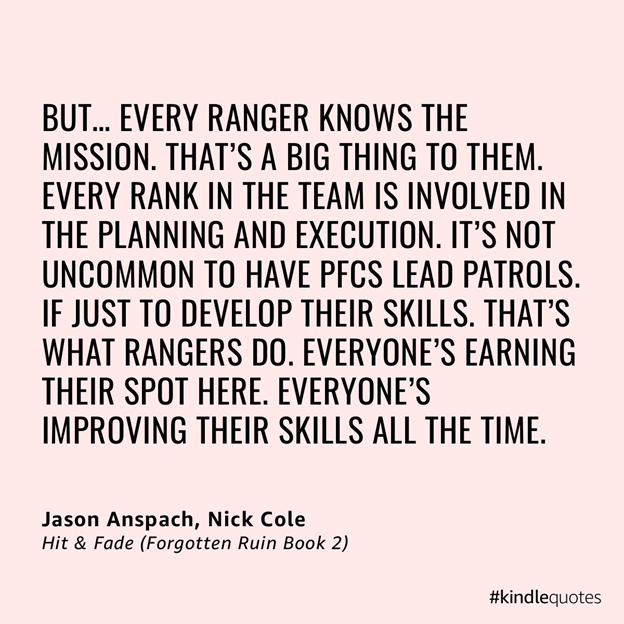The construction industry can learn a lot about Lean Planning from the mission planning techniques of the Army Rangers. Brian Winningham of Field Driven Lean explains.
This quote comes from a work of fiction, but it is absolutely true. Every Army Ranger is part of mission planning. In the Rangers, new soldiers (with less than a year in the Army) start leading patrols of people much more senior than them. Many special operations units typically work this way, as do after action reviews (AARs), with all participants expected to provide their perspectives. The result is that leadership still directs the focus, but the plan, the outcome, and the learning belong to everyone.
People on high performing teams don’t let their egos get in the way of learning, no matter how bad it stings. You swallow it and learn to improve. When you live and work daily with legends (and we all do!) you want to be better, so you never fail them. Together is how you face everything; all of us is better than any single one of us.
Army Rangers Mission Planning
In the Army Rangers, mission failure is never an option. It’s written into the Ranger Creed and is repeated every day by everyone in the Regiment. This is where servant leadership really starts to make a difference. We all serve the mission; this is our purpose, our North Star. When leaders serve the mission, their decisions (even the difficult ones) can be made and executed without regard for their own personal outcome. Because they also serve the mission, they understand they might be required to give their life to “optimize the whole” and ensure mission success. They accept this because everyone beside them accepts the same thing without reservation. People can have different responsibilities and different roles, but everyone is required to do their part, or the mission is a failure.
Maybe you feel the stakes aren’t this high in your job. I disagree. Our work in the built environment is very dangerous and often deadly serious. People’s lives and livelihoods are at stake; life and death are at play in all we do. When I talk to young builders and ask them about the projects they have completed, they typically begin by telling me how many millions of dollars they have built. I stop them and ask, “How many square feet is that?” When they provide their best guess, I ask them a final question: “So based upon those numbers, how many people’s lives have you impacted?” They usually get quiet for a moment, and then you see the light come on. This is the real measure of what we do, of everything we do. It is the only thing that truly counts, and it doesn’t matter if it is because we are working together in battle or in building the spaces that people inhabit.
How can you use lessons from the Army Rangers to supercharge your Lean planning? Here are five takeaways you can deploy today.
1. Include everyone.
Planning is one of the most crucial aspects of the work we do. It is how we learn to work together so that when the “bullets start flying” (figuratively) we know what to do because we know what everyone else is doing. This is why you must make sure everyone is together and you aren’t planning with any of the groups separately. This may mean rescheduling if you have no-shows or cancellations. If you don’t include everyone, your plan will always be incomplete.
2. Understand and improve your “muscle memory.”
Learning and knowledge, or “muscle memory” as we called it in the Rangers, is what you fall back on when things don’t go according to plan. It is rooted in the fundamental principles of the work we do. If you are ever ambushed by unexpected problems, the only way past them is through them, and you rely on the basics to do that. In the Rangers, we are taught that “violence of action” in a developing situation will beat a good plan every day, and this relies on muscle memory: not having to think through your steps. It takes practice and planning—learning and knowledge—to develop this muscle memory. In our industry, too often the muscle memory that people fall back on is “command and control,” which generates predictable results, like claims and disputes. Spend some time thinking through what “muscle memory” means for you while leading in a tense situation. Is your instinct to take control or trust your team?
3. Go slow to go fast, and continuously improve.
The method we used to learn everything in the Rangers was called Crawl, Walk, Run. This is the way all planning and learning should be approached: start with the most basic of tasks and work up into combinations of tasks that produce expected results. Attention to detail is another Ranger mantra. Attention to the details in your planning and your execution is critical to achieving better outcomes on your projects. We also embraced the Lean principle of continuous improvement, using Plan/Do/Check/Adjust/Repeat until we could do it without errors, even in the dark of night. We didn’t wait to try new things either and we made course corrections and wholesale changes as we worked through problems and made plans. This repetition of action created muscle memory, and the practice of continuous improvement ensured we stayed agile and able to continuously adapt as our methods evolved.
4. Plan for your plan to fail.
No plan survives first contact. As World War II leader and U.S. President Dwight D. Eisenhower said, “Plans are worthless, but planning is everything” A plan only gives us the impetus to start our journey. As soon as we take that first step, we start to find new data. Many times, our first impulse is to discount the new data because it doesn’t match the plan, but success requires restraint. If there is time, make a new plan. If it is an ambush, fall back on Lean muscle memory habits and assault through until the situation is stabilized—and then? Make a new plan (again). Things never go according to plan in construction. For example, there are changes to the scope, but not to the schedule. Knowing your plan will fail doesn’t mean you should skip planning in the first place; it means re-planning as conditions change, and as often as necessary.
5. Celebrate the wins as a team.
Esprit de corps is an essential aspect of being an Army Ranger. It is defined as “a feeling of pride, fellowship, and common loyalty shared by the members of a particular group.” Purpose (or mission) is critical to this, as is servant leadership. Esprit de corps comes from each person; it’s personal and can maybe even feel spiritual (reciting the Ranger Creed is emotional for me; it gives me goosebumps and I have even shed a tear or two). Having pride in the work you do, celebrating a project well done, and emphasizing the impact your team has made creates this feeling and drives the culture in your team. Time spent nurturing esprit de corps in your team is time very well spent.
It isn’t very complicated to learn to plan like a Ranger, but that doesn’t make it easy. In the Rangers, you earn that title every day. It isn’t given freely, and if it were, it wouldn’t be worth very much. Being a Ranger was one of the greatest challenges of my life and something I will be forever proud of. In closing, I’d like to share with you The Ranger Creed with hopes you can take something from it and apply it to your own mission, be it personal or professional.
The Ranger Creed
Written in 1974 by CSM Neal R. Gentry, the original command sergeant major of the reactivated 1st Ranger Battalion
Recognizing that I volunteered as a Ranger, fully knowing the hazards of my chosen profession, I will always endeavor to uphold the prestige, honor, and high esprit de corps of my Ranger Regiment.
Acknowledging the fact that a Ranger is a more elite soldier, who arrives at the cutting edge of battle by land, sea, or air, I accept the fact that as a Ranger, my country expects me to move further, faster, and fight harder than any other soldier.
Never shall I fail my comrades. I will always keep myself mentally alert, physically strong, and morally straight, and I will shoulder more than my share of the task, whatever it may be, one hundred percent and then some.
Gallantly will I show the world that I am a specially selected and well-trained soldier. My courtesy to superior officers, neatness of dress, and care of equipment shall set the example for others to follow.
Energetically will I meet the enemies of my country. I shall defeat them on the field of battle for I am better trained and will fight with all my might. Surrender is not a Ranger word. I will never leave a fallen comrade to fall into the hands of the enemy and under no circumstances will I ever embarrass my country.
Readily will I display the intestinal fortitude required to fight on to the Ranger objective and complete the mission, though I be the lone survivor.
RANGERS LEAD THE WAY!










